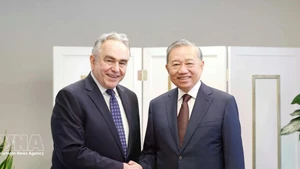A life devoted to the nation and its people
According to French historian Alain Ruscio, one of President Ho Chi Minh’s most admirable qualities was his lifelong devotion and self-sacrifice for the country and the people, without any concern for personal gain or glory.
In 1911, he departed from Nha Rong Wharf on a journey to find a path to national liberation, carrying nothing but his patriotic spirit and the aspiration to win independence for Viet Nam. Returning to France under the name Nguyen Ai Quoc, he joined the French Socialist Party and became one of the founding members of the French Communist Party at the Tours Congress in 1920.
Nguyen Ai Quoc was among the few members of the then-young French Communist Party, who resolutely opposed colonialism. He published numerous articles in L’Humanité on colonial issues and founded the Union Intercoloniale, which brought together activists from various colonies such as Algeria, Guadeloupe, and Martinique.
According to official reports at the time, Nguyen Ai Quoc lived a humble life in a small room on Compoint Alley, Paris. He was self-taught, deeply knowledgeable in both politics and everyday life, and fluent in many languages.
Alain Ruscio emphasised that President Ho Chi Minh always distinguished between the French people and the colonial regime, seeing the French people as allies in the struggle against colonialism. His struggle became a symbol of resistance for oppressed peoples around the world.
He also contributed many articles to Le Paria — the only newspaper for colonised peoples — covering not only Viet Nam but also the Black liberation movements in the US. Nguyen Ai Quoc’s image left a lasting impression on many French citizens, especially among intellectuals, as a symbol of the fight against injustice.
France was the setting for the convergence of President Ho Chi Minh’s aspirations for national independence and the ideals of “Liberty – Equality – Fraternity” from the French Revolution of 1789. It was also where he absorbed progressive humanistic values from French culture.
Historian Alain Ruscio affirmed that President Ho Chi Minh was an experienced revolutionary and a passionate nationalist who dedicated his life to the noble goal of national independence, freedom, and happiness for the people. During the resistance war against US imperialism, he remained steadfast in his pursuit of national reunification — a will embraced by the entire Vietnamese people and realised in 1975. President Ho Chi Minh was a moral exemplar and brilliant leader, both great and approachable, modest and devoted to the cause of national independence, reunification, and the people’s well-being. He aspired to build a strong, prosperous Viet Nam that could stand shoulder to shoulder with global powers.
In 1987, the UNESCO General Assembly adopted Resolution 24C/18.65, commemorating the 100th birth anniversary of President Ho Chi Minh and recognising him as an outstanding symbol of the national determination to gain independence for the Vietnamese people, contributing to the common struggle of all peoples for peace, national independence, democracy and social progress and an embodiment of the aspirations of peoples to assert their cultural identity and promote mutual understanding.
A model of pure international solidarity
The Museum of Living History, established in 1939 to mark the 150th anniversary of the French Revolution, located in the city of Montreuil, is the only place in France to feature a bust of President Ho Chi Minh and a dedicated “Ho Chi Minh Space” displaying many images of him. The museum honours historical figures who have left deep impressions with significant global influence. Out of deep respect for the great Vietnamese national hero and cultural icon, the Montreuil authorities have set aside a special room to preserve and exhibit valuable memorabilia and images of his revolutionary life in France under the name Nguyen Ai Quoc.
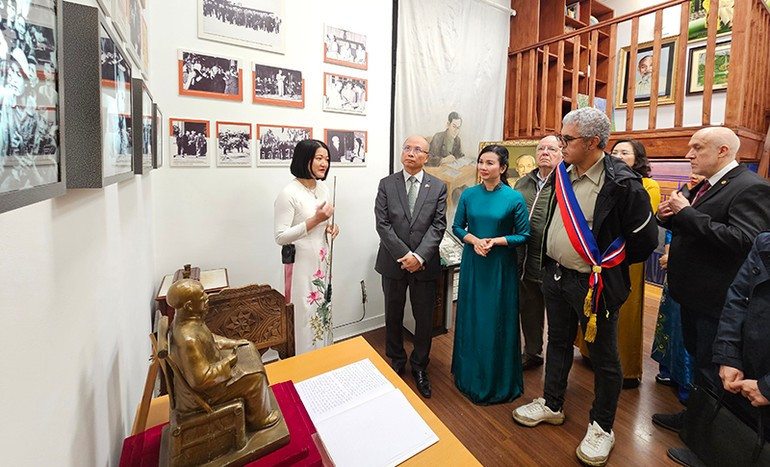
This room recreates the modest 10 square metre space in which President Ho Chi Minh once lived at No. 9 Compoint Alley (17th arrondissement, Paris) from 1921 to 1923. Original items such as the wooden door, house plaque, washbasin, and even the illustrated version of the brick he used to warm himself in winter are displayed alongside murals depicting the simple bed and table set, allowing visitors to visualise how he lived and worked in France.
Dr Véronique Fau-Vincenti, a historian and curator at the Museum of Living History, shared that the “Ho Chi Minh Space” is a heartfelt tribute from the French people. In order to preserve the historical memory and revolutionary legacy of President Ho Chi Minh in France, the museum leadership recreated this space to both commemorate and educate. Every detail contributes to a vivid portrait of a resilient, humble and profound revolutionary, leaving a deep impression on international friends.
As an organiser of many events honouring President Ho Chi Minh, former Mayor of Montreuil Jean-Pierre Brard shared that the great leader left an indelible mark on both Vietnamese and world history. President Ho Chi Minh contributed not only to Viet Nam’s liberation but also to global decolonisation movements, embodying genuine patriotism and pure internationalism.
According to Jean-Pierre Brard, President Ho Chi Minh strongly valued international solidarity and held deep affection for France. His tireless struggle was not only for the homeland but also for the communist ideal, for the independence and freedom of oppressed peoples, and for global peace and justice. His legacy remains relevant today and continues to inspire generations of Vietnamese and international friends.
A shining role model for the Vietnamese community in France
For the Vietnamese community in France, President Ho Chi Minh is a shining symbol of patriotism and self-sacrifice for national liberation and development. His example is a guiding light and a powerful source of inspiration for the overseas Vietnamese.
President Ho Chi Minh initiated the patriotic movement among the Vietnamese diaspora in France and laid the foundations for what would become the Vietnamese Association in France. Through his activities and ideas, he awakened the patriotic spirit among the Vietnamese living in France at the time.
His influence continues to resonate with today’s generations, including the third and fourth generations of overseas Vietnamese, as well as Vietnamese students studying in France.
Nguyen Van Bon, former Head of External Relations at the Vietnamese Association in France, stated that President Ho Chi Minh’s thoughts on unity and community cohesion, as well as his efforts to preserve friendship between the French and Vietnamese people, are powerful guiding principles for the community’s current activities. In the peaceful and reform-driven context of today, his ideas continue to inspire overseas Vietnamese to contribute to building a strong and prosperous homeland.
According to Ambassador Dinh Toan Thang, Vietnamese diplomatic missions and associations in France have an important role in preserving President Ho Chi Minh’s relics, legacy, and ideology, reflecting community cohesion and serving as a compass for the community’s contributions to the nation. The support of French friends for Viet Nam’s liberation and development is a valuable legacy. Vietnamese diplomats and representatives in France must preserve and promote that legacy for the country, the community, and Viet Nam–France relations.
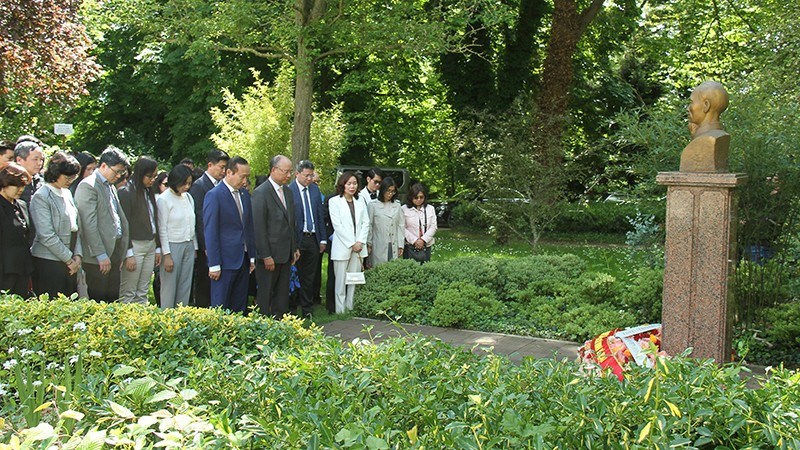

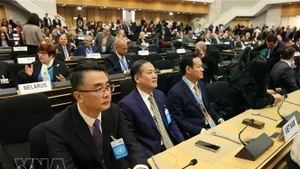
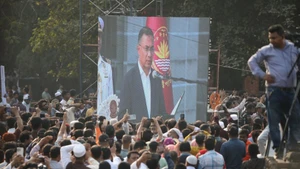
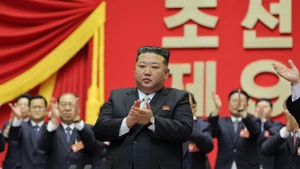
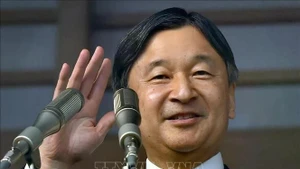
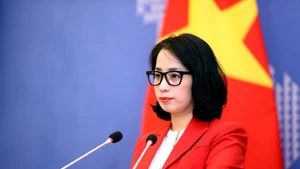
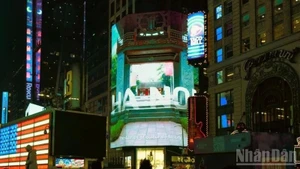
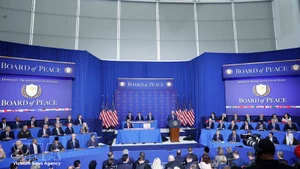
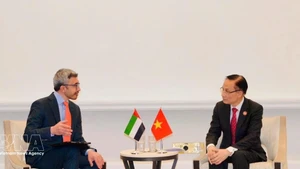
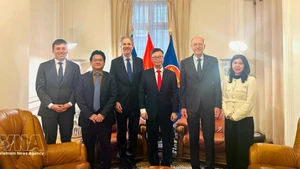
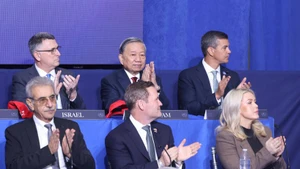
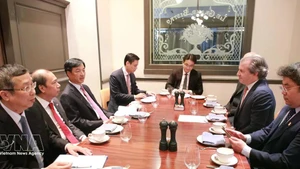
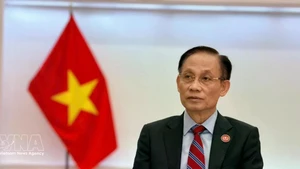
![[In pictures] Party General Secretary To Lam meets US President Donald Trump](https://en-cdn.nhandan.vn/images/dcd63867a0eed4c7753eb4bfb346593abc1ce710dfab8ad1b9aebd75ea6bf930b2ea13e4664779d689ba40aadd80f76d5d05d1208720fd7b0d811ace3a3297321c78cf738400e136e3f2d8790b24d43646e46edbe19517144a88f6ffb0d528f153574a7109328cc0949e4a4c16433c2ff751541639eefe4490518227264cbf8e/vna-potal-tong-bi-thu-to-lam-gap-tong-thong-hoa-ky-donald-trump-8599945.jpg.webp)
